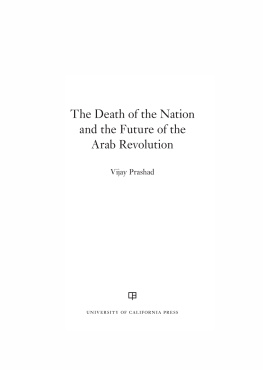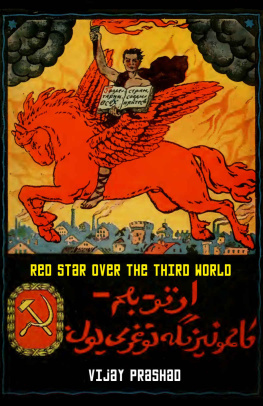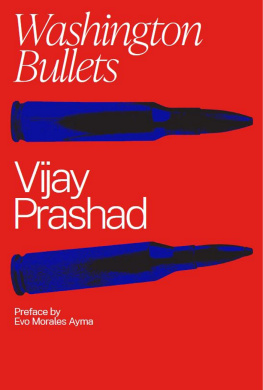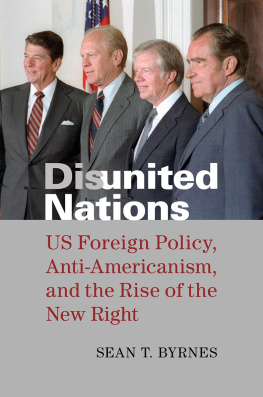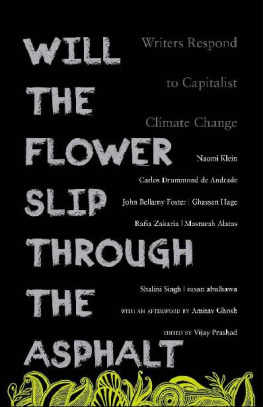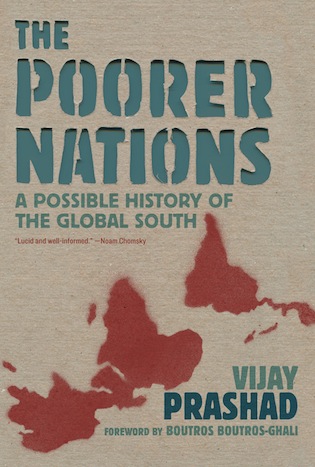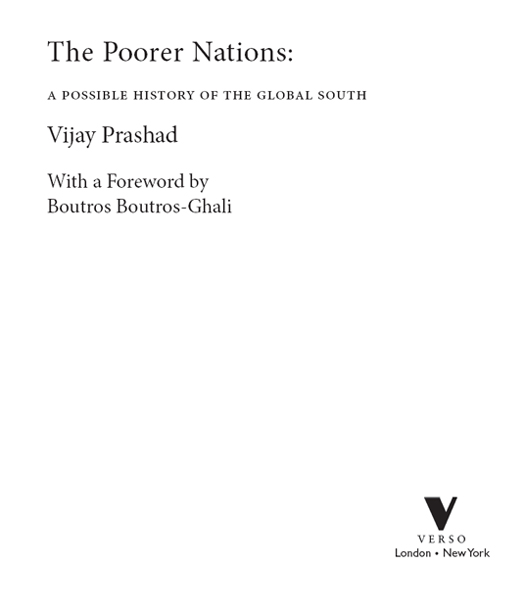Lisa Armstrong, just because.
Zalia and Rosa Maya, so that.
Soni Prashad and Rosi Samuel, as per prior arrangement.
First published by Verso 2012
Vijay Prashad 2012
Foreword Boutros Boutros-Ghali 2012
All rights reserved
The moral rights of the authors have been asserted
Verso
UK: 6 Meard Street, London W1F 0EG
US: 20 Jay Street, Suite 1010, Brooklyn, NY 11201
www.versobooks.com
Verso is the imprint of New Left Books
British Library Cataloguing in Publication Data
A catalogue record for this book is available from the British Library
Library of Congress Cataloging-in-Publication Data
Prashad, Vijay.
The poorer nations : a possible history of the Global South / Vijay Prashad.
p. cm.
Includes bibliographical references.
eISBN: 978-1-84467-953-9
1. Developing countriesEconomic policy.
2. Developing countriesForeign economic relations.
3. NeoliberalismDeveloping countriesHistory.
4. Developing countriesHistory. I. Title.
HC59.7.P7145 2012
330.91724dc23
2012036260
v3.1
Contents
Foreword
This very significant, highly readable and interesting book should be welcomed by policy and academic circles, especially in the developing countries but also worldwide, and the author congratulated for having undertaken to write about a critical period in the history of the global South.
He has succeeded in producing a unique, exceptional study that weaves together different events, processes and strands into a comprehensive overview of the struggle of the developing countries to change the world economic order and place their development at the center of global preoccupations. The author also discusses their efforts to organize their own collective action for advancing these goals in the international arena, and offers important insights into the dynamics of the frustrating dialogue and negotiations between the South and the North, with the developed countries all too often resorting to stonewalling tactics.
This volume is a major contribution to the institutional history of the South, made by someone from the South who has the developing countries situation and cause close to his heart. It highlights the critical need for scholarship on development, South-South and North-South problematique to be undertaken by authors from the South. This domain has for too long been dominated by scholars from the North. Also, many of the analyses, in trying to be objective and to tread a fine line between the positions of the North and the South, failed to be partisan to the cause of development and the weaker partners in this global tango. The sympathetic approach to the cause and case of the South taken by Vijay Prashad is refreshing and is to be commended.
The author should be thanked for his effort to recall some of the early enthusiasm that characterized the Third World movement. The historical picture needs to be clarified and remembered. Vijay Prashad has helped open the vista on complex interrelated events that have preceded todays global situation and standoff. Many of his observations and conclusions are not necessarily favorable to the South, as they point out missed opportunities or inadequate efforts arising from the subjective and objective weaknesses of developing countries. As such, the study could be useful in future efforts to improve and energize their collective action in the world arena.
It is to be hoped that this kind of analysis will contribute to renewed interest in development and in many of the valuable ideas and objectives that were sidelined or forgotten during the recent multilateral journey, so ably depicted by the author. The book should be made required reading in universities of the South and for all those entering or working in the civil service in developing countries. Without knowledge of history and of ones own past it is impossible to conceive the path to the future. The North is well equipped, has its version of history and wants it to be universally accepted. It is clear in its mind as to what it wants and what it is protecting. The countries of the South are not properly equipped. They have become quite dependent intellectually on the North, its analyses, information, assessments and solutions, as concerns global issues and their domestic situations and objectives. Professor Prashads study is a contribution to the intellectual-cum-political emancipation of developing countries and their empowerment through greater self-reliance on their own intellectual and analytical resources, i.e. their intellectual liberation from dominance by the North.
Boutros Boutros-Ghali
Former UN Secretary-General and
Chairman of the South Centre Board
Introduction
THE THIRD WORLD PROJECT
The Third World today faces Europe like a colossal mass whose project should be to try to resolve the problem to which Europe has not been able to find the answers.
Frantz Fanon, 1961
The massive wave of anticolonial movements that opened with the Haitian Revolution (17911804) and came into its own by the last quarter of the nineteenth century broke the legitimacy of colonial domination. No longer could it be said that a European power had the manifest destiny to govern other peoples. When such colonial adventures were tried out, they were chastised for being immoral.
In 1928, the anticolonial leaders gathered in Brussels for a meeting of the League Against Imperialism. This was the first attempt to create a global platform to unite the visions of the anticolonial movements from Africa, Asia, and Latin America. Considerations of expediency and the convulsions of World War II blocked any progress on such a platform. It would have to wait until 1955, in Bandung, Indonesia, when a smattering of newly independent or almost independent African and Asian countries sent their leaders to confer on a planetary agenda. The Bandung dynamic inaugurated the Third World Project, a seemingly incoherent set of demands that were actually very carefully worked out through the institutions of the United Nations and what would become, in 1961, the Non-Aligned Movement (NAM).
The central concept for the new nations was the Third World. The Third World was not a place; it was a project. Galvanized by the mass movements and by the failures of capitalist mal-development, the leaderships in the darker nations looked to each other for another agenda. Politically they wanted more planetary democracy. No more the serfs of their colonial masters, they wanted to have a voice and power on the world stage. What did that voice say? It spoke of three main themes:
a. Peace. It had become apparent by the mid 1950s and early 1960s that the Cold War between the two superpower blocs was catastrophic for The International Atomic Energy Agency of 1957 was a child of Bandung, and a cornerstone of the Third World Project.
b. Bread. The new nations of Africa and Asia, and the renewed national agendas of Latin America, explicitly recognized that the countries they had seized were impoverished. Any direction forward would have to confront the legacy of colonial economywith the advantages seized by the Atlantic powers and the trade rules drawn up to benefit those historical, not comparative, advantages. Economists like Ral Prebisch of Argentina, who would become the first director-general of the UN Conference on Trade and Development (UNCTAD), challenged the Atlantic institutions such as the General Agreement on Trade and Tariffs (GATT) and the IMF, which Prebisch called a conspiracy against the laws of the market. When Prebisch took the helm at UNCTAD, the economic arm of the Third World Project, he announced the need for a new order in the international economy so that the market functions properly not only for the big countries but the developing countries in their relations with the developed.general framework that the Third World fought for a revision of the free trade agenda, for better commodity prices, for primary goods cartels (out of which came OPEC), and for a more generous policy for the transfer of investment and technology from North to South. Fought at each turn by the Atlantic powers, the Third World took refuge in the UN General Assembly with the 1973 New International Economic Order resolution. It was the highest point of the Third World Project.



